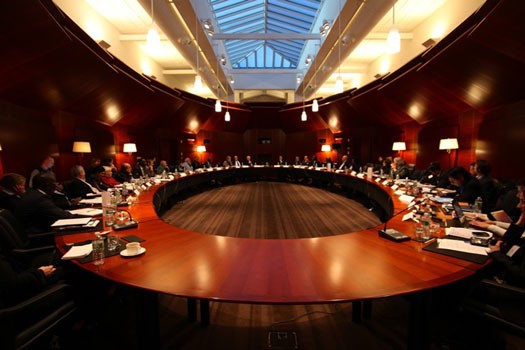New York, November 14, 2013 – More truth commissions are being created now through peace agreements than at any other time in history. But are they living up to high expectations for truth, accountability, and reconciliation in societies emerging from violent conflicts? This week, the Kofi Annan Foundation and the International Center for Transitional Justice (ICTJ) held a three-day, high-level symposium to explore the challenges and benefits of truth commissions emerging from peace processes.
The symposium, titled “Challenging the Conventional: Can Truth Commissions Effectively Strengthen Peace Processes?” was held at Greentree, New York, from November 12-14, 2013 with the presence of experienced peace mediators and transitional justice experts. It aimed to examine how truth commissions can have an effective chance to achieve their goals in the aftermath of conflict.
“Truth-seeking can give a voice to victims and their families and perhaps help them to find closure. Truth seeking can help determine the accountability of individuals. However, truth seeking is not only about individual responsibility; it’s also about society, about the state and its institutions,“ said Kofi Annan, former Secretary-General of the United Nations, in his opening remarks.
Annan was instrumental in negotiating a peace agreement in Kenya in 2008, as part of The Kenya National Dialogue and Reconciliation, which included a Truth, Justice and Reconciliation Commission (TJRC) to examine past crimes stretching back to Kenyan independence in 1963.
The symposium also looked at four other cases of truth commissions emerging from a peace process: Guatemala (peace accord in 1994), Sierra Leone (1999), the Democratic Republic of the Congo (2002/2003), and Nepal (2006).
The participants identified several challenges: powerful perpetrators may attempt to prevent any effort of accountability and truth from being introduced in the peace framework. They may accept commissions, only on the condition that they are not really independent. They may neglect a commission once established; or ignore its findings.
National civil society organizations have consistently resisted attempts to establish ineffective commissions, or marginalize them. Their ability to do so successfully requires international support, flexibility to respond to changing political environments, and the creative use of international principles.
Creativity is essential. One-size-fits-all templates do not help, and they may even complicate the scenario, mismanaging the expectations of society. “Expectations must be realistic for these commissions,” explained David Tolbert, President of ICTJ. “They are not panaceas or final chapters of a troubled story: they are often the beginning of a long process to rebuild the rule of law and confidence in state institutions. Parties to a peace negotiation, who realize truth-seeking is a fundamental aspect for long-term sustainability must isolate spoilers and articulate a clear long term vision as early as possible.”
Avoiding the illusion of a panacea should also lead to realistic and manageable mandates for truth commissions. They can hardly be a fix-all for all societal ills. Pablo de Greiff, the UN special rapporteur on the promotion of truth, justice, reparation and guarantees of non-recurrence, warned that the over-expansion of truth commissions’ mandates presents practical problems in truth commission processes.
“Truth commissions’ mandates, both in terms of the violations they are to examine and especially the functions we are expecting them to perform, are constantly growing, while the constraints they operate under have not changed. There is disconnect between what we expect truth commissions to do and the capacity and power they actually have,” said De Greiff.
Participants included: senior practitioners and experts from the fields of peace making and transitional justice, peace mediators, representatives of regional bodies, and key players in the diplomatic community and the United Nations.
The outcomes of these discussions will be published in the form of a final report.
PHOTO: Kofi Annan, former Secretary-General of the United Nations, and David Tolbert, president of the International Center for Transitional Justice (ICTJ). (Arnaldo Vargas for ICTJ)
